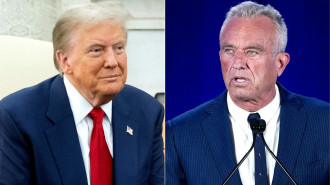What have the protests in Syria's Suwayda achieved one year on?
Activists in the southern Syrian province of Suwayda on Friday marked the first anniversary of an uprising against the Assad regime which took the country by surprise and has carried on for several months.
The protests in Suwayda which began in August 2023 were reminiscent of the peaceful protests which took place across the country in 2011, calling for democracy and an end to the Assad regime’s dictatorship.
They started as a reaction to the poor economic situation in the province and Syria as a whole, with people lamenting living conditions and the lack of basic necessities and services.
But they soon became a major movement with political demands, including the removal of President Bashar al-Assad’s regime and a peaceful transfer of power.
Suwayda’s unique situation
Suwayda is a Druze-majority Syrian province in a Sunni-majority country and the protests called into question the regime’s alleged status as a protector of Syria’s religious minorities, which it has always tried to use to gain legitimacy.
The province’s religious makeup meant that it had a unique status during the Syrian uprising and conflict which began in 2011. While Suwayda did see sporadic protests against the regime then, unlike in other parts of Syria these remained mostly peaceful and did not descend into armed conflict.
The regime relied on the spiritual leaders of the Druze community to maintain order in the province, granting them a measure of autonomy in local affairs to keep the situation stable.
However, Syria’s economic crisis, exacerbated by war, regime corruption, and sanctions, has left over 80% of the country in poverty, and discontent had been brewing for a long time before the protests began in August 2023.
When the protests began, Sheikh Hikmat al-Hijri, the spiritual leader of the Druze community, declared support for the protests and their demands, and he was joined by the majority of Druze religious leaders.
The support of Druze community leaders for the protests played a key role in the regime’s inability to suppress them by force. It could not use its military against the protesters, as it had done in 2011 for fear of creating a wider conflict.
The wide appeal of the protests and the fact that unlike before, they were happening in nearly all the villages and towns in the province, further stymied regime action against them.
No concessions from the regime
The protests however have not achieved political or economic concessions on the ground after several months.
Protesters still however have hope that their movement will gather momentum.
Hamza al-Maaroufi, a local activist told The New Arab’s sister site Al-Araby Al-Jadeed that he was hopeful because of growing quiet opposition to the regime.
“Even some of those who were previously considered supporters of the regime have started to express discontent with its policies, cursing it in secret and sometimes openly,” he said.
Another activist, Ali Obeid, said that the protests had created a growing awareness of concepts such as citizenship, rights, and the rule of law in Suweida but added that the regime had adopted new ways to suppress the protests without intervening directly.
"The regime's strategy is essentially about stirring civil strife to achieve its goals,” he told Al-Araby Al-Jadeed.
He said that a prominent regime officer had said, "We can kill them, but we won't; instead, we'll let them kill each other," and added that looting, kidnapping and murder had increased in Suwayda, without perpetrators being apprehended.
While the Suwayda protests are still active, remaining a thorn in the side of the regime, they have not translated into a national movement despite focusing more on national rather than local slogans.
Another activist, Kamal Al-Halabi pointed out that the protest movement had not managed to build strong alliances with opposition forces in Syria and did not receive international support. He put this down to a "lack of strong political organisation capable of guiding [the protests] to clear strategic goals".
Laith Abi Nader, Al-Araby al-Jadeed's correspondent in Suweida, contributed to this report.







 Follow the Middle East's top stories in English at The New Arab on Google News
Follow the Middle East's top stories in English at The New Arab on Google News
![The new film casts Israeli actors to tell the story of Mary while leaving out Palestinians [Getty]](/sites/default/files/styles/image_330x185/public/2024-11/GettyImages-2172155541.jpg?h=199d8c1f&itok=wJWyXDEQ)
![Ben & Jerry's has taken Unilever to court for its alleged attempts to silence it [Getty]](/sites/default/files/styles/image_330x185/public/2024-11/GettyImages-2183900214.jpg?h=199d8c1f&itok=jEcYtQ64)
